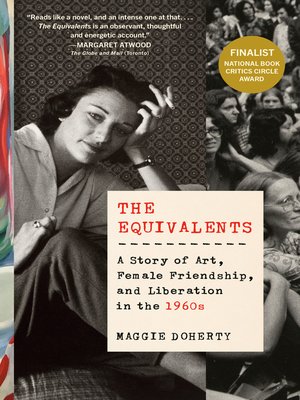The Equivalents
ebook ∣ A Story of Art, Female Friendship, and Liberation in the 1960s
By Maggie Doherty

Sign up to save your library
With an OverDrive account, you can save your favorite libraries for at-a-glance information about availability. Find out more about OverDrive accounts.
Find this title in Libby, the library reading app by OverDrive.



Search for a digital library with this title
Title found at these libraries:
| Library Name | Distance |
|---|---|
| Loading... |
FINALIST FOR THE NATIONAL BOOK CRITICS CIRCLE AWARD
In 1960, Harvard’s sister college, Radcliffe, announced the founding of an Institute for Independent Study, a “messy experiment” in women’s education that offered paid fellowships to those with a PhD or “the equivalent” in artistic achievement. Five of the women who received fellowships—poets Anne Sexton and Maxine Kumin, painter Barbara Swan, sculptor Marianna Pineda, and writer Tillie Olsen—quickly formed deep bonds with one another that would inspire and sustain their most ambitious work. They called themselves “the Equivalents.” Drawing from notebooks, letters, recordings, journals, poetry, and prose, Maggie Doherty weaves a moving narrative of friendship and ambition, art and activism, love and heartbreak, and shows how the institute spoke to the condition of women on the cusp of liberation.
“Rich and powerful. . . . A love story about art and female friendship.”
—Harper’s Magazine
“Reads like a novel, and an intense one at that. . . . The Equivalents is an observant, thoughtful and energetic account.”
—Margaret Atwood, The Globe and Mail (Toronto)
In 1960, Harvard’s sister college, Radcliffe, announced the founding of an Institute for Independent Study, a “messy experiment” in women’s education that offered paid fellowships to those with a PhD or “the equivalent” in artistic achievement. Five of the women who received fellowships—poets Anne Sexton and Maxine Kumin, painter Barbara Swan, sculptor Marianna Pineda, and writer Tillie Olsen—quickly formed deep bonds with one another that would inspire and sustain their most ambitious work. They called themselves “the Equivalents.” Drawing from notebooks, letters, recordings, journals, poetry, and prose, Maggie Doherty weaves a moving narrative of friendship and ambition, art and activism, love and heartbreak, and shows how the institute spoke to the condition of women on the cusp of liberation.
“Rich and powerful. . . . A love story about art and female friendship.”
—Harper’s Magazine
“Reads like a novel, and an intense one at that. . . . The Equivalents is an observant, thoughtful and energetic account.”
—Margaret Atwood, The Globe and Mail (Toronto)







